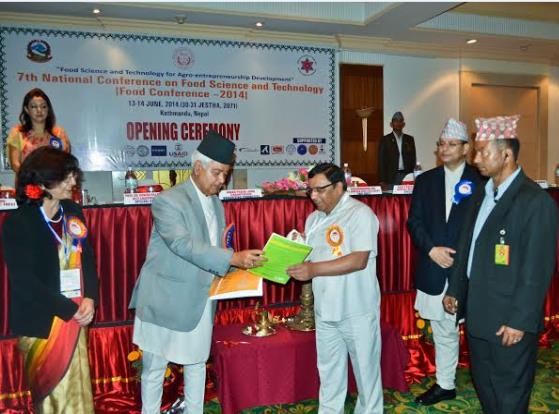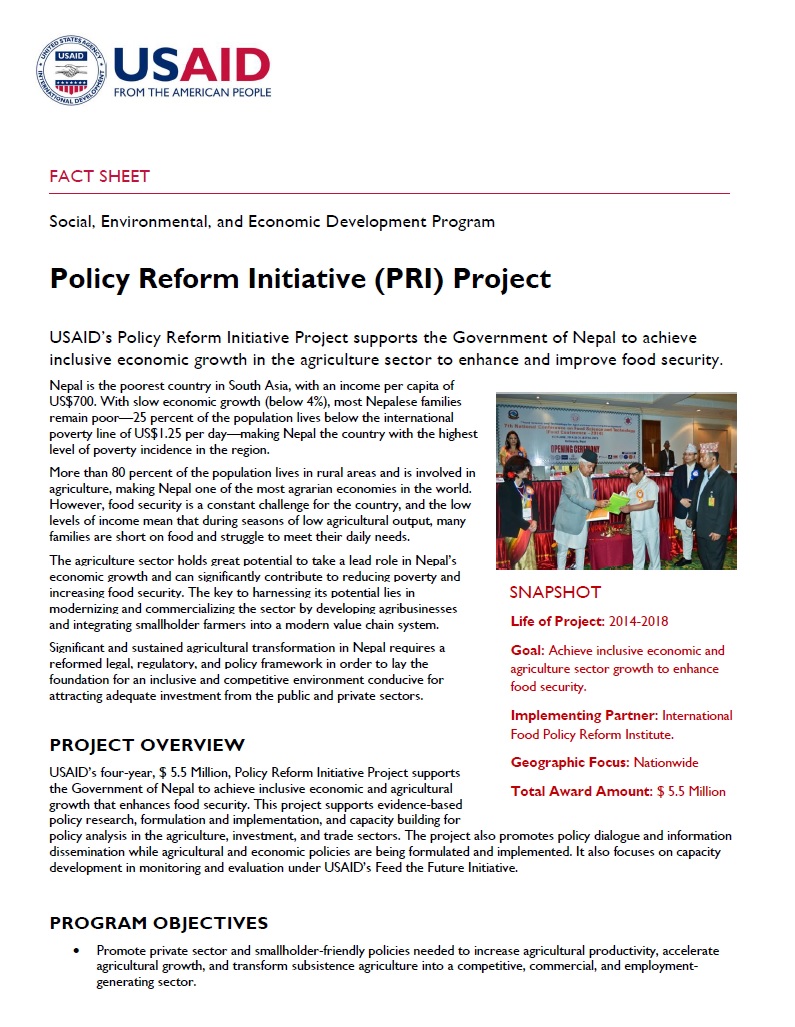
Policy Reform Initiative (PRI) Project
USAID’s Policy Reform Initiative Project supports the Government of Nepal to achieve inclusive economic growth in the agriculture sector to enhance and improve food security.
Nepal is the poorest country in South Asia, with an income per capita of US$700. With slow economic growth (below 4%), most Nepalese families remain poor—25 percent of the population lives below the international poverty line of US$1.25 per day—making Nepal the country with the highest level of poverty incidence in the region.
More than 80 percent of the population lives in rural areas and is involved in agriculture, making Nepal one of the most agrarian economies in the world. However, food security is a constant challenge for the country, and the low levels of income mean that during seasons of low agricultural output, many families are short on food and struggle to meet their daily needs.
The agriculture sector holds great potential to take a lead role in Nepal’s economic growth and can significantly contribute to reducing poverty and increasing food security. The key to harnessing its potential lies in modernizing and commercializing the sector by developing agribusinesses and integrating smallholder farmers into a modern value chain system.
Significant and sustained agricultural transformation in Nepal requires a reformed legal, regulatory, and policy framework in order to lay the foundation for an inclusive and competitive environment conducive for attracting adequate investment from the public and private sectors.
FACTSHEET: Policy Reform Initiative (PRI) Project ![]() (pdf - 243k)
(pdf - 243k)
PROJECT OVERVIEW
USAID’s four-year, $ 5.5 Million, Policy Reform Initiative Project supports the Government of Nepal to achieve inclusive economic and agricultural growth that enhances food security. This project supports evidence-based policy research, formulation and implementation, and capacity building for policy analysis in the agriculture, investment, and trade sectors. The project also promotes policy dialogue and information dissemination while agricultural and economic policies are being formulated and implemented. It also focuses on capacity development in monitoring and evaluation under USAID’s Feed the Future Initiative.
PROGRAM OBJECTIVES
- Promote private sector and smallholder-friendly policies needed to increase agricultural productivity, accelerate agricultural growth, and transform subsistence agriculture into a competitive, commercial, and employment-generating sector.
- Link farmers with markets, promote commercialization, and enter global markets by expanding and increasing the export of agricultural commodities.
- Foster a conducive environment for business and for securing investment from both the public and private sectors.
- Improve the interaction of the Government of Nepal with the private sector for meaningful policy reform.
- Improve monitoring and evaluation capacity under USAID’s FTF Initiative.
PROJECT ACTIVITIES
- Strengthen input systems, especially seeds and fertilizers in production, delivery, research & development and varietal release process.
- Promote agribusiness and contract farming by facilitating the introduction and implemention of the Agribusiness Promotion Act and the Agricuclture Mechanisation Policy.
- Support the introduction of new Food Safety Policy and Regulations, which will safeguard public health and improve the health and safety standards of domestic produce, making it more suitable for international markets.
- Facilitatate the introduction and implementation of the new Industrial Enterprise Act, the Foreign investment and Technology Tranfer Act, and the Intellectual Property Rights Policy, creating a favorable investment climate for both national and international parties.
- Support the Government of Nepal to improve the trade policy environment and increase agricultural exports through building its capacity for policy analysis in trade related issues and trade negotiation.
- Encourage the Government of Nepal's engagement with the private sector by improving mechanisms for advocacy, networking, and information distribution.
- Encourage private sector investment in agriculture.
- Facilitate policy dialogues to push for reform.
- Strengthen capacity g of relevant stakeholders(government, private sector, civil socieitya and think tanks) in policy analysis and implementation.
- Improve the monitoring and evaluation capacity of FTF implementing partners.
PLANNED OUTCOMES
The PRI Project is expected to achieve the following results:
- Strengthened seed systems and markets through the implementation of the Seed Policy for the wider implementation and adoption of improved varieties and hybrids.
- Introduction and implementation of the Agribusiness Promotion Bill and the Agriculture Mechanization Policy by the Ministry of Agriculture Development.
- Development of regulations and guidelines concerning food safety and quality, including plant quarantine, animal quarantine, and food inspection.
- Improved capacity and environment within the government for policy analysis, formulation, and implementation.
- Improved capacity of monitoring and evaluation under USAID’s FTF Initiative








Comment
Make a general inquiry or suggest an improvement.